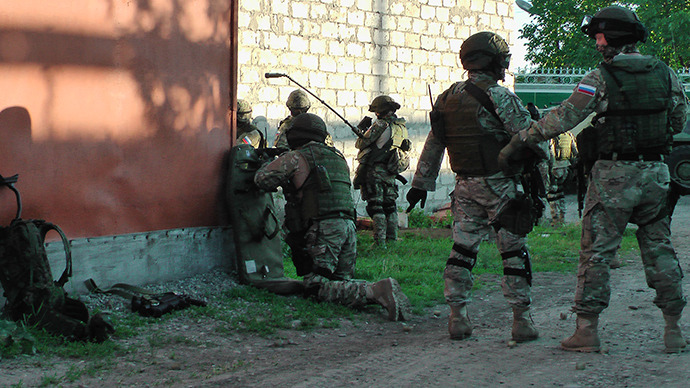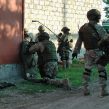
War With Ukraine Pulls Best Russian Military Units From North Caucasus
Publication: Eurasia Daily Monitor Volume: 11 Issue: 156
By:

The Ukrainian crisis has overshadowed the continuing low-level insurgency in Russia’s North Caucasus. Besides shifting public attention, the conflict in Ukraine is evidently shifting Russian forces from the volatile region between the Black Sea and the Caspian Sea. For years, the best combat-ready Russian forces were concentrated in the North Caucasus to fight first the Chechen pro-independence movement and later the insurgency that spread across the entire region. As Russia is increasingly drawn into the conflict with Ukraine, Moscow is forced to relocate its best prepared military units from the North Caucasus to Ukraine.
Some observers regard this as a potential “window of opportunity” for the North Caucasian militants. “As of now the relocation of experienced servicemen from the regions of the North Caucasian Federal District to southeastern Ukraine has started and the relocated individuals are mainly not Caucasians,” a blog post on the Kavkazskaya Politika website stated. “This will significantly weaken Russian forces and undermine their work against the armed underground in the North Caucasus. No doubt, this will allow the militants of the Caucasus Emirate to strengthen their ranks at least to some extent, if not overpower the Russian forces.” The blogger alleged that foreign actors would also try to fuel insurgency in the North Caucasus in order to further weaken Russia and its capabilities in its war on Ukraine. In addition, the author stated, Moscow’s financial woes will force it to adopt a more frugal approach to financing the North Caucasus, which will antagonize the local bureaucrats, who are used to unchecked corruption. According to the observer, a combination of a lack of well-trained troops and unhappy regional elites may result in serious problems for Russian rule in the North Caucasus, (kavpolit.com, September 3).
Preliminary information on the involvement of Russian forces in Ukraine and their losses provides some support for the opinion that Russian forces stationed in the North Caucasus are being relocated to the Russian-Ukrainian frontline in large numbers. The organization Zabyty Polk (Forgotten Regiment), which specializes in research on lost combatants and helping their families (polk.ru, accessed September 8), published an approximate description of the Russian forces that are fighting in eastern Ukraine. The overall number of the Russian forces fighting in Ukraine and stationed on the border with Ukraine is estimated at about 12,000–15,000 servicemen. A breakdown reveals that Russian servicemen from various military units based in Chechnya, Dagestan, Stavropol region, North Ossetia, Ingushetia, Karachaevo-Cherkessia, Adygea, Abkhazia and Kabardino-Balkaria are participating in the Russian-Ukrainian conflict. Several military units based in Krasnodar and Rostov regions, which are adjacent to the North Caucasus, are also taking part in the conflict. In fact, the majority of the Russian forces fighting in Ukraine appear to have come from Russian military units based in the North Caucasus (zpolk-org.livejournal.com, August 26).
At the end of August, the Committee of Soldiers’ Mothers of Stavropol region independently compiled a list of Russian army losses in Ukraine, estimating that about 400 servicemen have been killed or wounded. Most of them came from three Russian motorized brigades—the 19th Separate Motorized Rifle Brigade, based in Vladikavkaz, North Ossetia; the 17th Separate Guards Motorized Rifle Brigade, stationed in Shali, Chechnya; and the 8th Separate Guards Motorized Rifle Brigade, stationed in Shatoi, Chechnya (tvrain.ru, August 27). Chechen and Dagestani soldiers fighting in Ukraine reportedly suffered massive losses. As Russia has not officially declared war on Ukraine, the authorities have tried to cover up these stories by promising to pay large amounts of money to the relatives of the slain servicemen to keep them quiet (Kavkazky Uzel, August 29).
The dynamic of the Russian-Ukrainian conflict suggests that Russia is likely to use an increasingly large portion of its military resources on fighting the Ukrainian government forces. Russian military units stationed in the North Caucasus will have to be deployed to Ukraine in increasingly large numbers. This development is bound to have an impact on the situation in the Russian North Caucasus. Even though the recent threat by the Islamic State—formerly the Islamic State of Iraq and Syria (ISIS)—to launch a campaign against Russia “to free the North Caucasus” is so far hard to assess (RIA Novosti, September 3), Chechen and other North Caucasian militants, hardened in the clashes in the Middle East, might find it easier to return to the North Caucasus and create an upsurge in the activities of the insurgency there.
However, the primary danger for Russian rule in the North Caucasus comes from the anger of local bureaucrats and the general population, who will bear the brunt of economic sanctions and Moscow’s decreasing willingness and ability to finance this peripheral region. The Russian propaganda machine “forgot” its previous campaign accusing North Caucasians of “robbing” Russia and abusing ethnic Russians, and is now calling on all citizens of Russian to fight “the Ukrainian fascists” (ansar.ru, September 5). This type of consolidation is unlikely to last for long given that there is no external threat to Russia, while Russia’s expansionism is coming at a high price for the Russian people.




